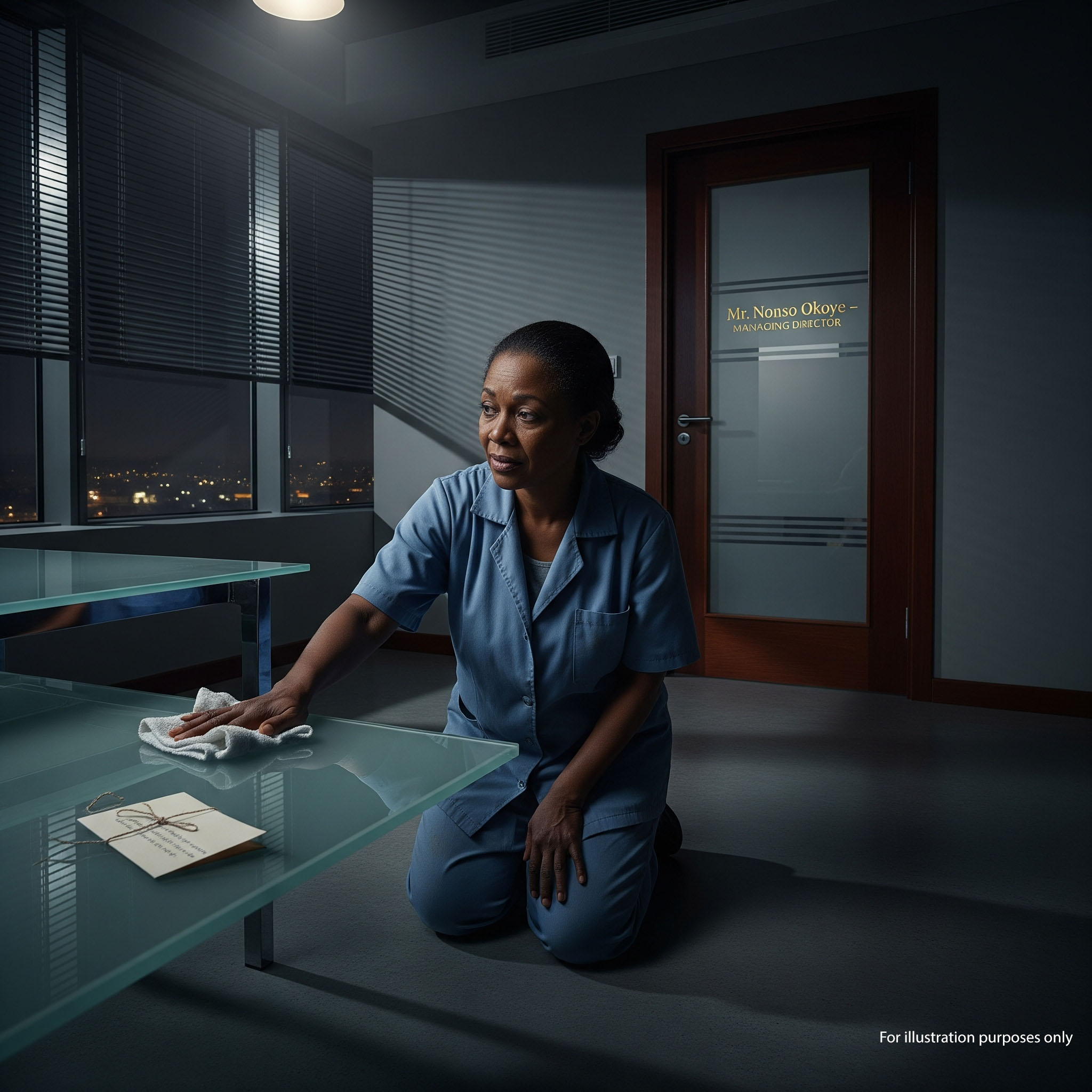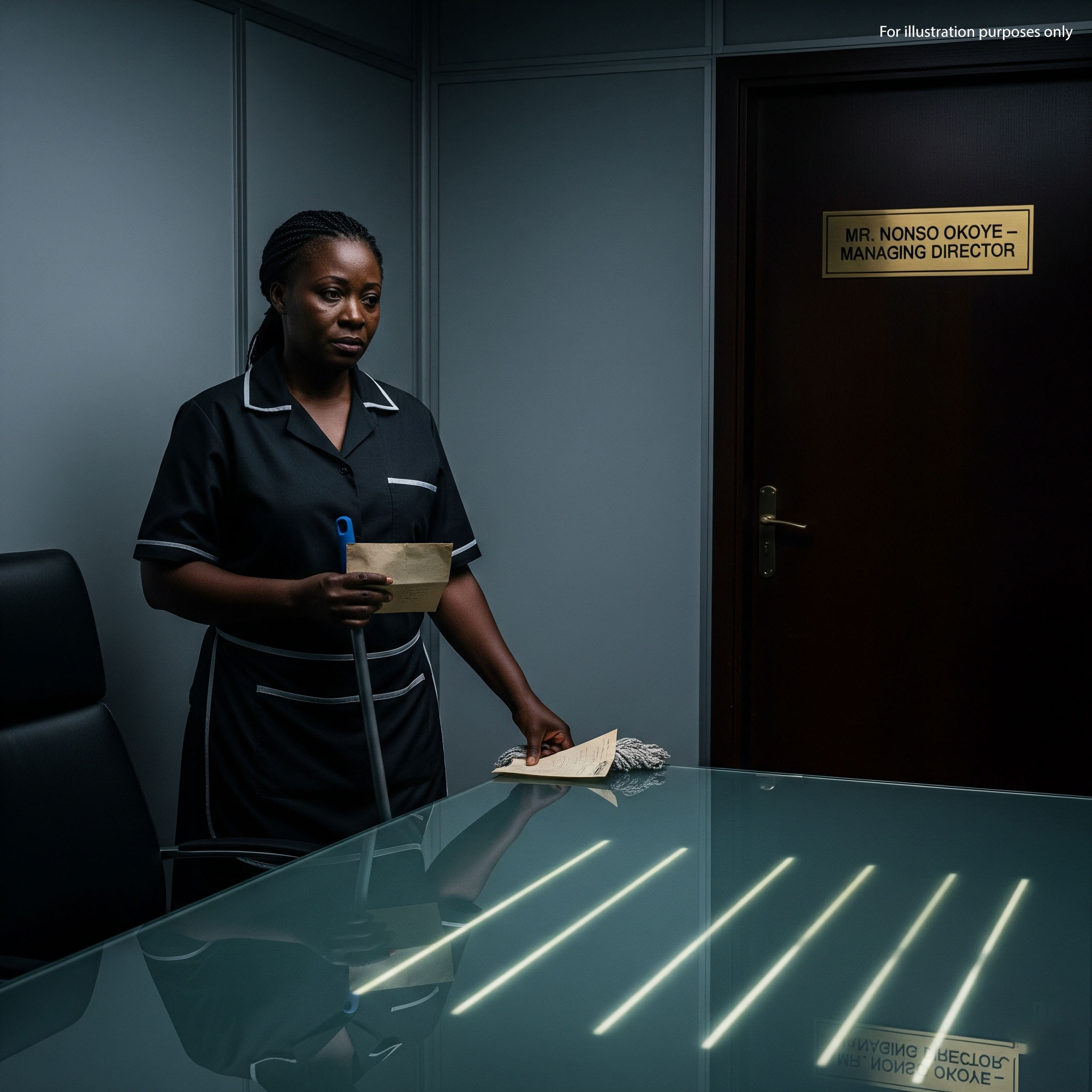They say time heals. But some wounds don’t fade. They sit quietly inside you—like dust gathering under a desk, unnoticed, until the light hits it just right.
My name is Lucia. I was seventeen when my life split in two.
It was my final year in school, back in Enugu. I was the shoemaker’s daughter, born to a mother who sold bananas at the market. I had a plan—graduate, get out, maybe teach.
Then came Nonso.
He was the boy with the perfect smile. Wealthy, smooth, always leaning over my desk during chemistry with that charming laugh. I thought it was fate.
It wasn’t.
When I told him I was pregnant, he blinked like I’d spoken another language.
“Are you sure it’s mine?” he asked, too calm.
“It’s yours, Nonso. I haven’t been with anyone else.”
He didn’t argue. He just disappeared.
Days later, I heard he’d been shipped off to the UK. A scholarship, they said. Just like that.
That same week, my mother found the letter from the clinic.
She didn’t cry. She screamed.
“You shame this house. Go find your man—or get out.”
I begged. I cried. But I left. With nothing but a cracked phone and a growing belly.
For weeks I slept in unfinished buildings, sold oranges to strangers, scrubbed other people’s clothes to survive. When labor came, I gave birth under a mango tree, behind the stall of an old midwife named Doña Estela.
“It’s a boy,” she whispered.
I named him Chidera—“What God has written.”
He was my beginning.
We survived together. He clung to me like breath. We shared street food and stories, curled together on borrowed mats. On his sixth birthday, he asked:
“Where’s my daddy, Mama?”
I smiled. Lied.
“He’s far away, baby. Maybe lost. Maybe looking for us.”
But Nonso never came. Not even once.
When Chidera was nine, he started coughing. Not the usual kind. It was deep, raw—followed by fevers that wouldn’t break. The doctor said it was a treatable condition. All we needed was sixty thousand naira.
I had four.
I begged. Sold my last pair of shoes. But in the end, it wasn’t enough.
He died holding my finger.
I wrapped him in a blue blanket and buried him beside the same mango tree where he entered the world.
I placed a torn photo of Nonso beside him. He never saw the man he came from.
I whispered, “I’m sorry, my son. I was all you had.”

Years passed. Grief taught me how to disappear.
I moved to Lagos and found a job—night cleaner at a glossy tech firm in Victoria Island.
“You wear brown. You clean. You don’t talk to executives,” the supervisor barked.
Fine by me.
I cleaned quietly—offices, boardrooms, bathrooms.
Then one night, I reached the top floor.
The gold nameplate on the glass door read:
Mr. Nonso Okoye – Managing Director
The mop handle slipped from my hands.
He sat behind the desk, older, sleeker, wrapped in a custom suit that screamed success. The same eyes, same smirk—like life had never said “no” to him.
I cleaned his floor every night.
He never looked twice.
Then one afternoon, as I was emptying his bin, my name tag slipped from my chest and landed near his feet.
He picked it up, reading slowly.
“Lucia… Were you ever in Enugu?” he asked, squinting.
I smiled. Too small. “No, sir.”
He shrugged and went back to typing.
That night, I overheard him laughing in the boardroom:
“I once knocked up a girl back in school. Poor thing thought it was forever. They always do.”
The men chuckled.
Something inside me broke. Quietly, like a plate slipping underwater.
I ran to the restroom, pressed my palms to the mirror, and wept like I had on the day Chidera died.
Later, I wrote a letter.
No anger. Just truth.
“You didn’t know, Nonso. But while you flew away to a better life, I gave birth under a mango tree and buried your son under the same one nine years later. His name was Chidera. You never said goodbye. But I cleaned up after you—first in life, now in your office.”
I left it beneath his mug. Then I requested a transfer. I couldn’t breathe near him anymore.
Two weeks later, a knock came at my door.
A woman stood there—dignified, dressed in soft white, her eyes as familiar as they were kind.
“I’m Adaeze,” she said. “Nonso’s sister.”
I stepped back.
“He found your letter. He didn’t know. Our parents told him you… ended the pregnancy.”
“No,” I whispered. “I gave him life. For nine years.”
She covered her mouth. Tears slid silently down her face.
“He visited the grave. He saw the photo. He wants to meet you.”
We met again under the mango tree.
He didn’t speak. Just knelt beside Chidera’s grave and wept into the soil.
“I failed him,” he whispered. “And you.”
I didn’t say, I told you so. I just let him grieve. That’s all there was left.
He planted a tree beside the grave.
Then he looked at me, eyes hollow. “What did you dream for him?”
“That he’d be good,” I said. “Better than we were.”

Months later, Nonso opened a school—Chidera’s House—for girls like me, tossed away when they needed help most. A school for girls who got pregnant, got blamed, and got erased.
He asked me to help run it.
“It’s not pity, Lucia,” he said. “It’s the least I can do.”
There’s a mural in the school lobby: a woman holding a child up toward the sun.
Sometimes I stand before it, and I think—this is what healing looks like. Not perfect. Not pain-free. But honest.
Nonso sends me a stipend now. I never asked for it.
“It’s not charity,” he says. “It’s what I owe.”
I sleep easier these days.
One afternoon, a quiet girl with braids came up to me.
“Are you really Chidera’s mom?”
“Yes,” I said.
“I want to be strong like you,” she whispered. “Even when I’m scared.”
I hugged her tight. “You already are, my dear. You just haven’t seen it yet.”
There’s a plaque on the school’s wall:
“For every invisible child, and every silenced mother—your stories matter.”
I don’t know if I’ll ever forgive completely.
But I know this: my voice is mine again.
And when I sweep these classrooms filled with laughter and light, I no longer feel small.
Because the same hands that once buried a child now build a future.
And the dust I once swallowed to survive?
Now, it feeds the roots of something better.
Something lasting.
Something named Chidera.